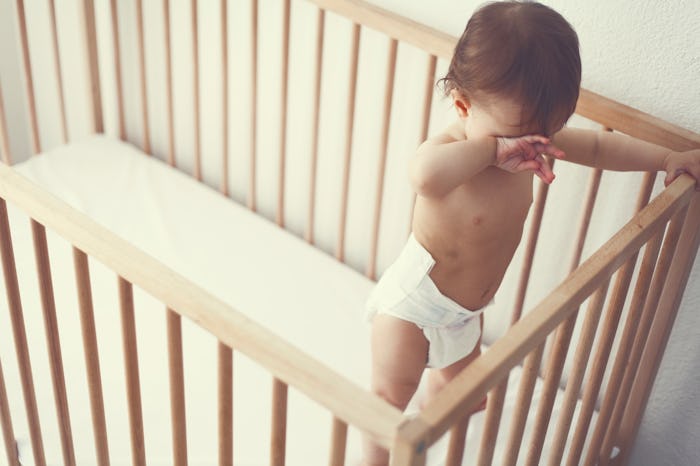Life

Experts Say Babies *Can* Have Nightmares, But Here's When They Think It Starts
A baby that's particularly restless at night or seems to be having trouble sleeping isn't exactly an ideal scenario. Not only are you low on sleep, but you're probably wondering what's keeping your babe up. I mean, if they aren't tossing and turning with hunger or worried about climate change, what gives? Do babies start having nightmares young enough that it affects their sleep? It's a tricky question.
Pamela Schoemer, MD, a pediatrician at UPMC Children’s Community Pediatrics tells Romper, "Sleep specialists will say nightmares can occur as young as 1 year of age," and that "those may be the nights your child cries and seems truly frightened and will only fall back to sleep after you soothe and reassure them." Think of those times your toddler screams themselves awake, or runs into your room crying. Those are likely the times when your child could be experiencing a disturbing episode in their sleep. However, Schomer notes that we cannot know for certain when they truly begin, for the same reason that we don't always understand why our babies are crying, or why they're upset. They are simply too young to verbalize what is happening. Even as they begin to mature, finding the words to define what they are feeling might still be a challenge. Particularly if they don't yet understand what a dream is.
The American Academy of Pediatrics (AAP) noted on their website that nightmares typically happen in the second half of the night, when your child is sleeping the heaviest. They suggested that if you notice your child is frequently getting up that late at night, showing signs of anxiety or fear, that it might be nightmares. They urged parents to encourage their children to describe the experience as much as they can, so that parents can reassure the children that dreams are a fiction of the mind. Unfortunately, for babies who are still nonverbal, this isn't an option, and it leaves parents guessing as to what is going on.
But parents aren't the only ones scratching their heads. Dr. Cherilyn Cecchini of Your Doctors Online tells Romper that while "it is known that babies spend a greater amount of time in the rapid eye movement (REM) sleep cycle compared to adults, experts can't say with certainty if babies are actually dreaming during these periods." There is simply no way to peek into their adorable baby heads to determine if they are dreaming or having nightmares, and they can't tell us. It is frustrating, and can be overwhelming for parents who are looking for answers. She notes that "it is possible that babies may be dreaming as early as 2 weeks of age." But that there are those who "argue that babies need to have the ability to see and remember experiences in order to formulate dreams, and propose that dreaming doesn't actually happen until a few months after birth."
As someone who has struggled with night terrors my whole life, I was supremely grateful that my disquieted sleep did not pass on to my children. If your child is consistently waking at night, scared and fitful, you might consider talking to your pediatrician about what they think might be happening, or if they have any further solutions. Until then, you can just be there to comfort your child when they need you.